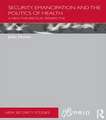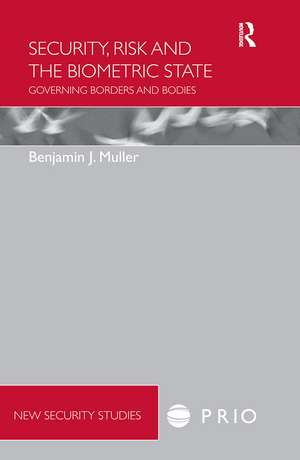Security, Risk and the Biometric State: Governing Borders and Bodies: PRIO New Security Studies
Autor Benjamin Mulleren Limba Engleză Paperback – 28 feb 2011
In the wake of the events of 9/11, the reliance on increasingly sophisticated and invasive technologies across a burgeoning field of applications has accelerated, giving rise to the term 'biometric state'. This book explores how these ‘virtual borders’ are created and the effect they have upon the politics of citizenship and immigration, especially how they contribute to the treatment of citizens as suspects. Finally and most importantly, this text argues that the rationale of 'governing through risk' facilitates pre-emptory logics, a negligent attitude towards 'false positives', and an overall proliferation of borders and ubiquitous risk, which becomes integral to contemporary everyday life, far beyond the confined politics of national borders and frontiers.
By focusing on specific sites, such as virtual borders in airports, trusted traveller programs like the NEXUS program and those delivered by airlines and supported by governmental authorities (TSA and CATSA respectively), this book raises critical questions about the emerging biometric state and its commitment and constitution vis-à-vis technology of ‘governing through risk’.
This book will be of interest to students of biopolitics, critical security, surveillance studies and International Relations in general.
Benjamin J. Muller is assistant professor in International Relations at Simon Fraser University, Burnaby, Canada. He completed his PhD in the School of Politics and International Studies at Queen’s University Belfast, Northern Ireland, in 2005.
| Toate formatele și edițiile | Preț | Express |
|---|---|---|
| Paperback (1) | 482.78 lei 6-8 săpt. | |
| Taylor & Francis – 28 feb 2011 | 482.78 lei 6-8 săpt. | |
| Hardback (1) | 1054.97 lei 6-8 săpt. | |
| Taylor & Francis – 18 feb 2010 | 1054.97 lei 6-8 săpt. |
Din seria PRIO New Security Studies
- 8%
 Preț: 416.47 lei
Preț: 416.47 lei -
 Preț: 363.03 lei
Preț: 363.03 lei -
 Preț: 411.04 lei
Preț: 411.04 lei - 13%
 Preț: 336.90 lei
Preț: 336.90 lei -
 Preț: 431.35 lei
Preț: 431.35 lei -
 Preț: 388.85 lei
Preț: 388.85 lei -
 Preț: 453.56 lei
Preț: 453.56 lei -
 Preț: 412.27 lei
Preț: 412.27 lei -
 Preț: 440.77 lei
Preț: 440.77 lei -
 Preț: 410.46 lei
Preț: 410.46 lei -
 Preț: 485.40 lei
Preț: 485.40 lei -
 Preț: 280.67 lei
Preț: 280.67 lei -
 Preț: 446.53 lei
Preț: 446.53 lei -
 Preț: 469.34 lei
Preț: 469.34 lei -
 Preț: 406.81 lei
Preț: 406.81 lei -
 Preț: 389.38 lei
Preț: 389.38 lei -
 Preț: 389.38 lei
Preț: 389.38 lei -
 Preț: 385.54 lei
Preț: 385.54 lei -
 Preț: 349.53 lei
Preț: 349.53 lei - 18%
 Preț: 1109.18 lei
Preț: 1109.18 lei -
 Preț: 389.11 lei
Preț: 389.11 lei -
 Preț: 469.34 lei
Preț: 469.34 lei -
 Preț: 438.14 lei
Preț: 438.14 lei
Preț: 482.78 lei
Nou
Puncte Express: 724
Preț estimativ în valută:
92.38€ • 96.26$ • 76.49£
92.38€ • 96.26$ • 76.49£
Carte tipărită la comandă
Livrare economică 03-17 aprilie
Preluare comenzi: 021 569.72.76
Specificații
ISBN-13: 9780415670098
ISBN-10: 0415670098
Pagini: 164
Dimensiuni: 156 x 234 x 9 mm
Greutate: 0.3 kg
Ediția:1
Editura: Taylor & Francis
Colecția Routledge
Seria PRIO New Security Studies
Locul publicării:Oxford, United Kingdom
ISBN-10: 0415670098
Pagini: 164
Dimensiuni: 156 x 234 x 9 mm
Greutate: 0.3 kg
Ediția:1
Editura: Taylor & Francis
Colecția Routledge
Seria PRIO New Security Studies
Locul publicării:Oxford, United Kingdom
Public țintă
Postgraduate, Professional, and UndergraduateCuprins
Introduction 1. Security, Risk, and the Biometric State: Governing Borders and Bodies 2. Are You Who You Say You Are? Biometrics and the Management of Borders and Bodies 3. Suspect(ing) Biometrics: Identity, Security and National ID Cards 4. Catastrophe, Narrative, and the Failure of Imagination 5. Securing the Political Imagination: Popualr Culture, The Security Dispositif and the Biometric State 6. A North American Biometric State? 7. Securitizing the Global Norm of Identity: Biometrics and Homo Sacer in Fallujah. Conclusion
Notă biografică
Benjamin J. Muller is Assistant Professor in International Relations and Political Theory at King's University College at the University of Western Ontario, London, Canada. He completed his PhD in the School of Politics and International Studies at Queen’s University Belfast, Northern Ireland, in 2005.
Recenzii
'A valuable contribution to the work being done, from different perspectives, on the theory of the state and the protection of fundamental rights.' - The International Spectator, Volume 46, Issue 1, 2011, 154
‘This book makes an important contribution by raising new questions in the often inadequately nuanced debate about contemporary states’ deployment of biometric technology... The book is undoubtedly a timely and most relevant contribution to a field of study that to some extent has been characterised by a lack of critical engagement with underlying issues such as discursive conditions, a lack of engagement with broader implications for bodies being targeted by this technology and the ‘risk regime’ within which biometric technologies are being constituted as rational, operative and superior solutions.’ - By Katja Lindskov Jacobsen, Danish Institute for International Studies (DIIS), in e-Internatioanl Relations, September 2012
‘This book makes an important contribution by raising new questions in the often inadequately nuanced debate about contemporary states’ deployment of biometric technology... The book is undoubtedly a timely and most relevant contribution to a field of study that to some extent has been characterised by a lack of critical engagement with underlying issues such as discursive conditions, a lack of engagement with broader implications for bodies being targeted by this technology and the ‘risk regime’ within which biometric technologies are being constituted as rational, operative and superior solutions.’ - By Katja Lindskov Jacobsen, Danish Institute for International Studies (DIIS), in e-Internatioanl Relations, September 2012
Descriere
This book examines a series of questions associated with the increasing application and implications of biometrics in contemporary everyday life.
















